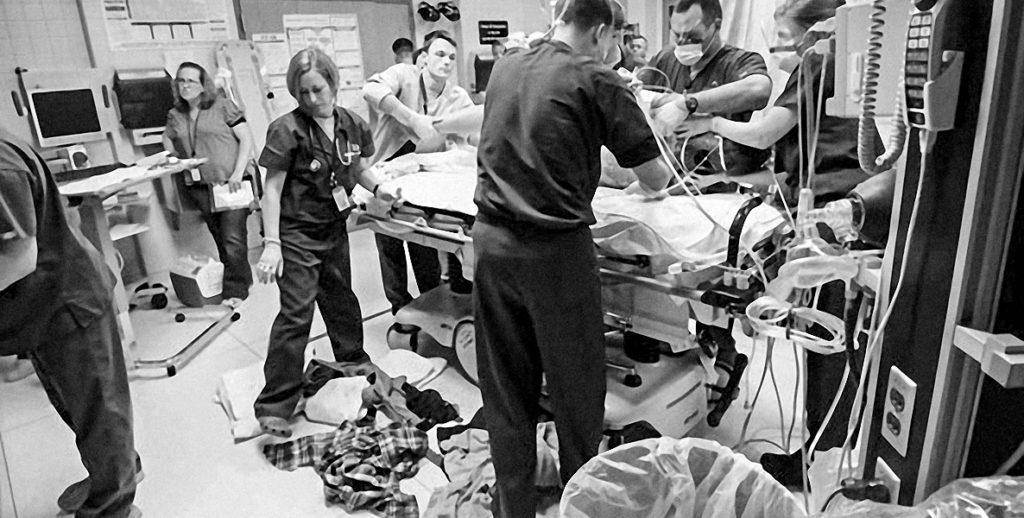On an average night, Penn Presbyterian trauma nurse Rhonda Browning will see one or two shooting victims, usually young Black men who are getting younger and younger each year.
When Browning began working as a trauma nurse nearly 20 years ago, the shooting victims were adults in their twenties and thirties, and now they’re mostly teenagers. A lot of them are still in braces, and the first thing they all do is ask for their mom.
A single mother of five boys, Browning becomes a de facto parent to countless teenagers in her trauma bay, until their real family arrives. She holds their hands and whispers in their ear that they need to hold on. Browning recorded an audio diary for Philly Under Fire as she tried to save the life of one gunshot victim. As someone who bears witness to the effects of violence nearly every night, Browning has her own scars and wonders how she can help to solve this epidemic.
Because, make no mistake, the explosion of gun violence in Philadelphia in 2020 was absolutely a public health crisis: 499 of our fellow residents were killed and another 2,200 shot.
Dr. Zaffer A. Qasim, an emergency medicine physician at Penn and a data expert, talks to Philly Under Fire about how, as the coronavirus pandemic raged on, gun violence only increased, too. “This is a health problem that’s affecting our whole population,” Qasim says. “We can certainly call it an epidemic.”
Addressing gun violence like an epidemic underlies the work of Dr. Ruth Abaya, a pediatric ER physician at Children’s Hospital of Philadelphia (CHOP) who also works with the city to collect and map data about the victims of gun violence. In theory, Mayor Jim Kenney’s administration agrees that gun violence is a public health issue. As far back as 2018, Kenney said “I have come to realize that the level of violence that we are experiencing is actually a public health crisis. It is not a crisis of crime; it involves crime, but it’s about public health.”
Kenney issued a call to action, asking his cabinet to develop a strategy for reducing shootings in the city. From that call to action the city created a Roadmap to Safer Communities in 2019 that lays out a public health strategy for reducing gun violence over the next five years.
But as our reporting makes clear in this episode, calling out the crisis as a public health issue only gets cities so far—to really move the needle, we need a sense of urgency, much like what we have seen mobilized for the Covid-19 pandemic. We need more data like what Ruth Abaya is collecting, a sustained investment in programs with proven effectiveness and a true willingness from city officials to bring all stakeholders to the table and cooperate across agencies.
Listen to the full episode here:
Ready for more? Stay up to date on all new episodes as they drop here.
Extra reading on the issues highlighted in this episode
More ways to dive in and stay engaged
- Read Dr. Zaffer Quasim’s study on the surge of trauma during Covid-19
- Read the City of Philadelphia’s Roadmap to Safer Communities plan
- Read about Kenney’s recent announcement to invest more in community programs
- Learn more about the Office of Criminal Justice
- Learn more about Councilmember Jamie Gauthier
- Helen Ubiñas at The Philadelphia Inquirer writes about Jamal Johnson’s hunger strike
- Learn more about Mayor Jim Kenney’s plans
- Check out the Philadelphia Crime Mapper—if you dare
How you can take action
Contact city officials and tell them to invest in data-backed solutions that work to curb violence. Here are the best people to reach out to, with links to contact information.
- Mayor Jim Kenney: (215) 686-2181
- First Deputy Managing Director Vanessa Garrett Harley
- Councilmember Kenyatta Johnson
- Councilmember Cindy Bass
- District Attorney Larry Krasner
- Police Commissioner Danielle Outlaw:
- Office of Violence Prevention
Now a little thank you …
Special thanks to our associate producer Nadira Goffe. We used a news clip in this episode from Purple Queen of PQRadio1 as she brokered a conversation between Mayor Kenney and Jamal Johnson. We also used a clip from Fox29 Philadelphia about gun violence in 2018. Special thanks to Spring Point Partners for funding this project. And, special thanks to Spring Point Partners for funding this project.

